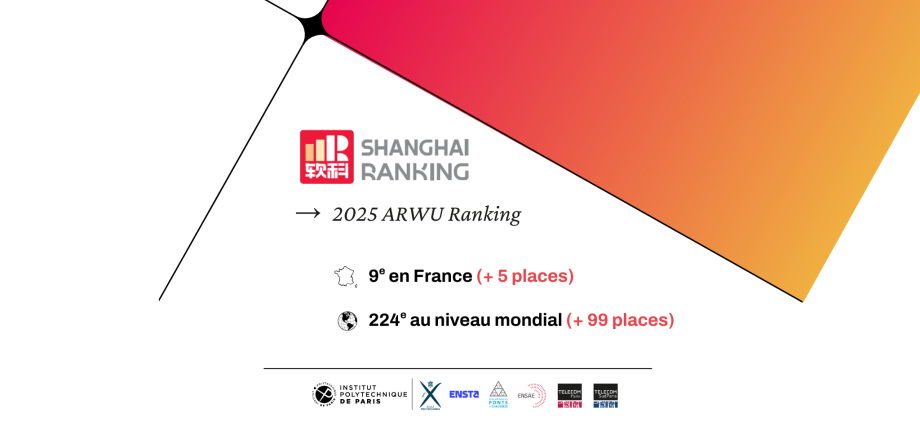ARWU 2025: IP Paris moves up 99 places to 224th worldwide

Shanghai Ranking
IP Paris moves up 99 places to 224th worldwide:
a new step in its international trajectory
Palaiseau, August 15th, 2025 – Shanghai Ranking Consultancy has just published its international ranking of universities (ARWU, Academic Ranking of World University).
For the first time since its creation in 2019, the Institut Polytechnique de Paris has entered the global top 250, reaching 224th place, a remarkable leap of 99 positions in just one year. On a national scale, IP Paris ranks 9th in France, moving up 5 spots compared to the previous year.
This step marks a milestone in the institution's development, driven by a clear ambition: to build a world-class institute of science and technology based on the combined strength of six leading French engineering schools.
It reflects the growing prominence of IP Paris on the international academic stage and the recognition of its increasing scientific impact.
"This ranking confirms the recognition of the deep, coordinated, and transformative work that we have undertaken. It progressively positions IP Paris in its rightful place among the world's leading scientific institutions. It is also an encouraging signal that underlines the soundness of our strategic choices, particularly in terms of recruiting top-level academics, and motivates us to continue our path with confidence" emphasizes Thierry Coulhon, President of Institut Polytechnique de Paris.
Strategic advances anchored in solid scientific results
The improvement in the ARWU ranking is based on:
• the growing presence of highly cited researchers,
• the rise in the weighted number of publications in Nature and Science,
• the continued increase in publications indexed in the SCIE/SSCI databases.
These positive results were also made possible by the strength of a high-level academic community supported by:
• 5,100 scientific publications,
• 45 research laboratories,
• 2,250 teacher-researchers and research staff,
• 7 interdisciplinary centres, driving research geared towards the major challenges of the 21st century (particularly in AI, climate, health as well as defence and security),
• an academic body with 41% international profiles, contributing to a growing global influence.
A collective momentum
This international recognition comes at a pivotal time for IP Paris: Institut Polytechnique de Paris is first and foremost the driving force behind a group of six top engineering schools – École polytechnique, ENSTA, ENSAE Paris, Télécom Paris, Télécom SudParis and, since July 2024, École nationale des Ponts et Chaussées (ENPC). The integration of ENPC marks the completion of the initial strategic perimeter defined when the Institute was created.
In the same spirit, the merger of ENSTA Paris – a founding member of IP Paris – with ENSTA Bretagne opens up new horizons in terms of research, training and innovation, particularly in the maritime and environmental fields.
A confirmed trajectory across all major international rankings
In addition to the ARWU ranking recognition, Institut Polytechnique de Paris is also ranked 41st worldwide and 2nd in France in the QS World University Rankings 2026 and 71st worldwide and 3rd in France in the Times Higher Education (THE) World University Rankings 2025.
Though each ranking is based on specific methodologies – whether in terms of academic reputation, employability, scientific output or citation impact – they all underscore the Institute’s steadily growing academic excellence, scientific contribution, and international visibility.
Created in 2003, the Shanghai ranking evaluates the world's top 1,000 higher education institutions based on six criteria, including the number of Nobel Prizes and Fields Medals, the presence of highly cited researchers, and the number of publications in leading scientific journals such as Nature and Science.













